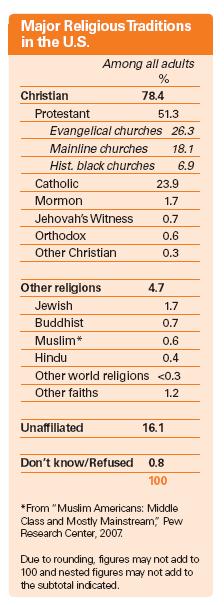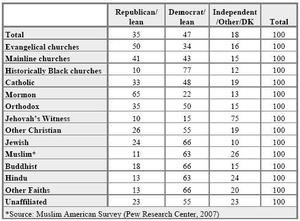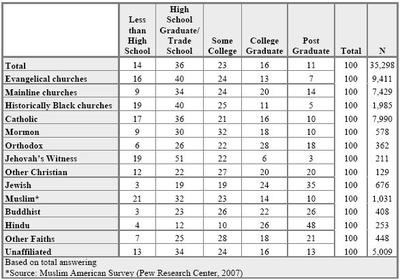 Yesterday, the Pew Forum On Religion & Public Life release the second part of a massive survey of American’s attitudes about religion. This was an in-depth survey of 35,000 Americans.
Yesterday, the Pew Forum On Religion & Public Life release the second part of a massive survey of American’s attitudes about religion. This was an in-depth survey of 35,000 Americans.
The full report (PDF) is here, but there are some interesting (and what I think are encouraging) findings.
The topline summary, I suppose, is that Americans are not dogmatic about their religion and faith. In other words, the Falwells and Dobsons are just that — the Falwells and Dobsons.
For example, the majority of Americans — a full 70% — believe that many religions (not just theirs) can lead to eternal life. Even for evangelical Americans, this number is still a majority — 57%.
I should probably note that I am using the word "Americans" here deliberately. I mean "Americans", and not necessarily "Christians" (some people believe the two are synonymous). The breakdown of out religions, as Americans, is on the right.
And most Americans (64%) believe that their religion can be interpreted in more than one "true" way; this also holds true for the majority of self-described evangelicals (53%).
92% of Americans believe in God (or a universal force), which is what you would expect. But when you dig deeper, you see that one-in-five Americans are not certain in their belief of God’s existence. Americans are also split about the nature of God: 60% believe He is a personal God (an actual figure), whereas 25% believe is he is an "impersonal force" (an energy without a body).
How religious are we? Not as much as some would like us to think. 55% said that religion was "very important" in their lives, and only 39% said they attend religious services once a week.
 Not surprisingly, those who say their religion is "very important" and/or attend religious service at least once a week and/or pray daily tend to skew conservative on the ideological scale.
Not surprisingly, those who say their religion is "very important" and/or attend religious service at least once a week and/or pray daily tend to skew conservative on the ideological scale.
In the post below, I wrote about Dobson vs. Obama, and their conflicting views of biblical interpretation. Most Americans (63%) believe that the Bible is the Word of God. This number is highest among Christians, compared with other religions. However, among Christians, there is disagreement over whether the Bible should be interpreted literally, word-for-word. The majority of black (63%), evangelical Protestants (59%) believe the Bible should be interpreted literally, word-for-word; the majority of Catholics, Mormons and mainline Protestants think every word should not be interpreted literally.
What strikes me about that is the relatively high number of evangelicals who DON’T believe in literal interpretation — about 41%.
God only talks to some of us apparently. Only 19% of Americans say that they receive specific answer to specific prayers once-a-week from God. I think many of those 19% are lying (or rationalizing).
An issue that is big with me is proselytizing (a word I’m never going to learn to spell correctly). 36% of Americans say they share their faith with others once a month, although this varies widely among religions. It jumps to 52% among evangelical religions and (no surprise here) 84% among Jehovah’s Witnesses. Yeah, we noticed, guys.
Most Americans (58%) believe that the "culture of Hollywood" does not threaten their values, although that number goes down when you start talking about evangelicals and Mormons. Most Americans (57%) don’t believe that abortion should be illegal in most or all cases, but that number goes down when you start talking about evangelicals and Mormons*. And most Americans (60%) do not agree with the statement "Homosexuality is a way of life that should be discouraged", but but that number goes down when you start talking about evangelicals and Mormons.**
On evolution, Americans are split 48% (agree with it as the best explanation for existence of life) and 45% disagree. This ties in hugely with one’s religious beliefs. For example, 58% of Catholics, 77% of Jews, and 72% of unaffiliated (agnostic/atheist/etc) agree with evolution, compared to 35% of Protestants (evangelical and mainline combined).
And finally, religion and education. One common theory is that as education increases, a person’s adherence to religion decreases. From the survey, there is this helpful data:
Hmmmm. I guess one could say that evangelicals are less educated, compared with Jews and Hindus. One could say that — but I’m not going to touch that with a ten-foot pole.
So where are we going, religiously? Well, Europe has become very secularized over the last several decades. America is a little slower, but it is heading that way. 7% of Americans say they were not affiliated with any religion as a child, but 16% say they are not affiliated with a religion now. So Americans are dropping out more than they are finding faith.
If this stuff interests you, I strongly urge you to browse the full report. It breaks down these issues by major sects (not just broad religions) — for example, 22% of those who are affiliated with the United Church of Christ believe government should do more to protect morality in society — and states — for example, 49% of North Carolinians attend church at least once a week (compared with 60% in Mississippi, and 23% in New Hampshire).
* I’m not talking about aborting evangelicals and Mormons; I’m talking about their opinions.
** Ditto

